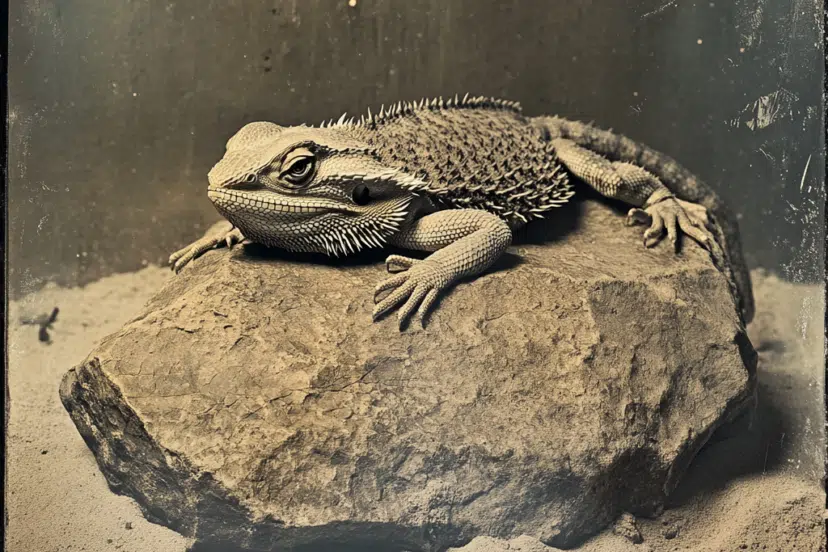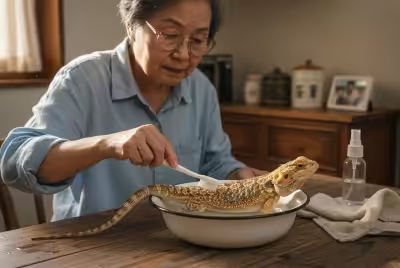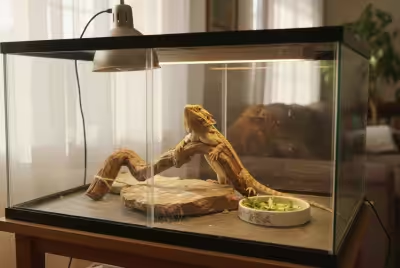Bearded Dragon Lifespan: A Complete Guide
If you’re the proud owner of a bearded dragon, you’ve probably wondered: How long will my scaly friend live? Understanding your bearded dragon’s life expectancy is crucial, not just for the emotional bond, but to provide them with the best care possible. Whether you’re a new bearded dragon owner or looking to improve the care you provide, this guide will help you understand the factors that influence your dragon’s lifespan and how to ensure they live a long, healthy life.
Why Knowing Your Bearded Dragon’s Lifespan Matters
When you bring home a bearded dragon, you’re in it for the long haul. These reptiles, with their curious and calm demeanor, make fantastic pets, but their lifespan isn’t as short as many expect. Knowing their life expectancy helps you prepare for the commitment they require, as well as what changes to anticipate as they age.
Average Life Expectancy of Bearded Dragons
On average, bearded dragons live 8 to 12 years in captivity, but some well-cared-for dragons can live up to 15 years or more. In the wild, their lifespan is typically shorter, averaging around 5 to 8 years due to predators, lack of stable food sources, and environmental stressors.
Life Expectancy in the Wild vs. Captivity
In captivity, bearded dragons benefit from a consistent food supply, proper lighting, controlled temperatures, and safety from predators, all of which significantly extend their lifespan. In the wild, they face a host of challenges, from harsh weather conditions to predation, which drastically shortens their life expectancy.
Factors Influencing Lifespan
Many factors affect a bearded dragon’s lifespan, including their diet, habitat, care, and genetics. It’s important to understand these influences so you can optimize their care at every stage of life.
Factors That Affect a Bearded Dragon’s Life Expectancy
Several key factors determine how long your bearded dragon will live. Let’s explore the most crucial ones and how you can manage them effectively.
Proper Diet and Nutrition
Feeding your bearded dragon a balanced diet is essential to their life expectancy. A healthy diet includes a mix of insects, vegetables, and occasional fruits, with the ratios adjusted based on their age.
Key Foods for Longevity
Young dragons need more protein, so crickets, dubia roaches, and silkworms are excellent choices. For adults, a larger portion of their diet should consist of leafy greens like collard greens, mustard greens, and dandelion greens. Avoid feeding them too many fatty insects like mealworms, as these can contribute to obesity.
Importance of Hydration
Don’t forget hydration! Bearded dragons don’t typically drink a lot of water, but providing a shallow dish of fresh water daily and lightly misting their vegetables can help keep them hydrated. You can also occasionally mist them directly, as they absorb moisture through their skin.
Lighting and Temperature Requirements
The right lighting and temperature are critical for your dragon’s overall health and longevity. Without proper UVB exposure and temperature control, they can develop serious health issues.
UVB Light and Its Role in Health
UVB light is essential for your bearded dragon to metabolize calcium and maintain bone health properly. Without it, they are at risk for metabolic bone disease (MBD), a condition that can significantly shorten their life. Ensure that their UVB light covers at least two-thirds of their enclosure and is replaced every 6-12 months.
Maintaining the Right Temperature Gradient
Creating a proper temperature gradient allows your bearded dragon to regulate its body temperature. The basking area should be around 95-105°F, while the cooler side of the enclosure should be between 75-85°F. This helps with digestion and overall comfort.
Cleanliness and Habitat Maintenance
A clean enclosure is vital to preventing the growth of bacteria, fungi, and parasites, all of which can harm your bearded dragon.
Handling and Stress Reduction
While bearded dragons are typically docile, excessive handling or a chaotic environment can cause them stress, which can, over time, impact their life expectancy. To make them feel secure, handle them gently and provide plenty of hiding spaces in their enclosure.
How to Extend Your Bearded Dragon’s Life
Want to give your bearded dragon the best chance at a long life? Here are some actionable tips to help them thrive.
Regular Vet Checkups
Just like any pet, bearded dragons benefit from routine vet checkups. A reptile vet can spot early signs of illness and offer advice on diet, lighting, and general care. Annual checkups, or more frequent if your dragon is aging or ill, can make a significant difference in their lifespan.
The Role of Supplements
Calcium and multivitamin supplements play a key role in preventing nutritional deficiencies. Dust their food with calcium powder 3-4 times a week and a multivitamin once a week. This helps avoid issues like metabolic bone disease and ensures they get the nutrients they might not be getting from their diet alone.
Mental and Physical Enrichment
Bearded dragons are intelligent creatures that need stimulation. Providing enrichment activities, like climbing structures, basking spots, and interactive toys, can keep their minds sharp and bodies active. Enrichment is just as important for their mental well-being as their physical health.
Common Health Issues That Can Shorten Lifespan
While bearded dragons are hardy reptiles, they are still susceptible to several health issues that, if not treated promptly, can dramatically reduce their life expectancy.
Metabolic Bone Disease (MBD)
MBD is one of the most common and severe conditions in bearded dragons, typically caused by a lack of UVB lighting and insufficient calcium in their diet. This disease weakens their bones, making them more prone to fractures and deformities.
Respiratory Infections
Cold temperatures and high humidity can lead to respiratory infections in bearded dragons. Symptoms include wheezing, excess mucus, or difficulty breathing. Keeping their enclosure at the right temperature and humidity levels is essential for preventing this issue.
Parasites and Impaction
Internal parasites can cause a host of digestive problems, while impaction (a blockage in the digestive system) is often caused by ingesting substrate or large insects. Be aware of what’s in your dragon’s enclosure and avoid feeding insects that are too large or difficult to digest.
Signs Your Bearded Dragon is Aging
As your bearded dragon gets older, there are several signs you can look for that indicate they are entering their senior years.
Slowed Movements and Appetite Changes
One of the most noticeable signs of aging is a reduction in activity. Older dragons tend to move slower and may sleep more. You might also notice changes in their appetite. While it’s natural for them to eat less as they age, monitor them closely to ensure they’re still getting the nutrients they need.
Adjusting Care for Senior Bearded Dragons
As your dragon ages, you may need to adjust their care. Provide softer foods, increase their hydration, and ensure their basking area is easy to access. Regular vet checkups are especially important for senior dragons to catch any age-related health issues early.
Conclusion
Providing the best care possible for your bearded dragon can ensure they live a long, happy life. By understanding the factors that influence their life expectancy—such as diet, lighting, and habitat cleanliness—you can extend their lifespan and keep them healthy. With the right care, your bearded dragon can be a wonderful companion for many years.
FAQs
- How long do bearded dragons live in captivity?
Bearded dragons can live between 10 to 15 years in captivity, with some reaching up to 20 years with proper care. Their lifespan in captivity is much longer than in the wild due to fewer predators, regular feeding, and a controlled environment. - How can I help my bearded dragon live longer?
To help your bearded dragon live a long, healthy life, provide a spacious enclosure, maintain proper temperature and lighting, offer a balanced diet with appropriate calcium supplements, and schedule regular vet checkups. Additionally, minimize stress by keeping their environment stable and clean. - What are the common signs that my bearded dragon is aging?
As bearded dragons age, they may become less active, spend more time basking, and their skin may appear rougher or more wrinkled. You may also notice a decrease in appetite or slower movement. However, with the right care, they can remain comfortable and healthy even in their senior years. - What factors can shorten a bearded dragon’s lifespan?
Factors that can shorten your bearded dragon’s lifespan include poor nutrition, inadequate lighting or temperature, dehydration, stress, and lack of regular health checks. Illnesses like metabolic bone disease or respiratory infections can also reduce their life expectancy if left untreated. - Can bearded dragons get diseases from poor diet or improper care?
Yes, improper diet and care can lead to several health issues. Lack of calcium can cause metabolic bone disease, and poor humidity or temperature control can result in respiratory infections. A balanced diet and proper habitat maintenance are key to preventing these issues and ensuring a long, healthy life for your dragon.




